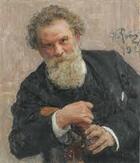
Vladimir Galaktiónovich Korolenko was born in Zhytomyr, the capital of Volinia (Ukraine), in 1853. At that time Volinia was a politically ambiguous region.
Since the Third Partition of Poland in 1795, the eastern part belonged to the Russian Empire and the western part to the Austro-Hungarian Empire. In fact, Vladimir learned to read Polish before he did Russian, since his family did not know the nationality that would be awarded to him.
Following the annexation of Volinia to the Russian Empire, the Korolenko family was given a "choice" of Russian nationality. In 1870 he studied in Petersburg at the Institute of Technology, and later at the Moscow Agricultural School, although he interrupted his studies after being expelled for belonging to a secret political organization linked to the revolutionary movement.
Arrested and deported in 1879 to northern eastern Siberia, he spent several years in the isolated Yakut region, until in 1885 he was allowed to return to Russia and settled in Nizhny Novgorod, where he met the young Maxim Gorky. In this same year he published one of the most famous stories of him, and for which he was considered one of the best writers of the time, Makar's dream, which tells the sad life of a Yakut abandoned to "bad luck" of the.
In the consecutive years, his writing lavishes us with other stories such as The murmur of the jungle, The vagabond and other stories, The blind musician, and Yom Kippur, from 1890. Korolenko exhibits a naive, realistic, natural narrative style, with a singular intelligent humor and not ironic. In 1893 he travels to America. Upon his return to Saint Petersburg, he participated in the management of the populist magazine The Russian Word (Russkoie slovo), which facilitated a direct public fight with his pen against the abuses of power.
An active journalist, social critic and political activist, Korolenko decided in 1895 to abandon literature to dedicate himself to denouncing injustices in the laws and in the police, becoming a popular figure.
In 1900 he settled in Poltava and was elected a member of the Academy of the Language, a title he resigned after two years, when the Tsar vetoed Gorky from entering the Academy. In 1906 he leads a campaign against military law and capital punishment. The only work of this period is a short autobiography with the title Historia de one of my contemporaries, the first part of which appears in 1910; the other, incomplete, was published posthumously in 1922.
From 1917 on he expressed his hostility towards the Bolsheviks, whom in letters addressed to the Commissioner of Public Instruction, Anatoli Lunacharsky, he called enemies of civilization. He died in 1921 in Poltava, in the middle of the civil war.





